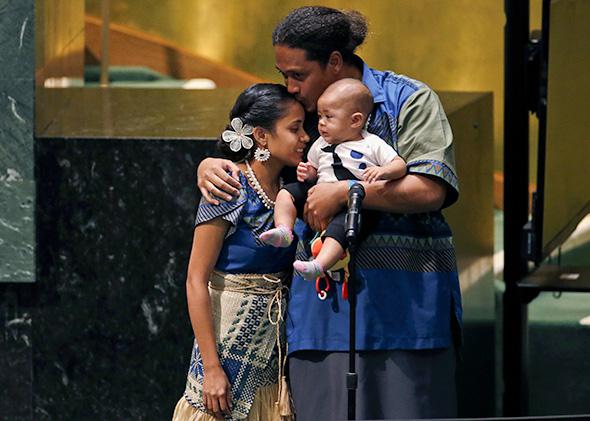It’s been buried under news of Syria, but today saw the single most important meeting on climate change in five years, a gathering of most world leaders at the United Nations in New York.
Predictably, almost nothing was accomplished.
Notably absent was any new U.S. pledge of support for a fund designed to help poor countries adapt to climate change. Instead, Barack Obama pledged to announce new carbon-cutting targets for the United States “next year.” Mashable has a continuously updating map of climate-related pledges made on Tuesday.
One of the day’s biggest wins was a pledge of $6 million by China. The media let out a collective yawn.
But there should have been outrage.
Obama’s “commitment” comes a day after new data showed that U.S. emissions grew in 2013 for the first time in five years (thanks to a resurgent coal industry), helping push global emissions to a new record high. Survey results released Tuesday from the Chicago Council on Global Affairs showed an uptick in concern over climate change since 2012, but it still ranks the issue relatively low on Americans’ worry list, perhaps due in part to the continued misperception of climate change as a far-off threat.
Not only is the United States not doing our part, we’re still actively making things worse, no matter the rhetoric from the White House. During Obama’s presidency, fossil fuel subsidies have actually grown.
Reaction to the day-long U.N. Climate Summit was almost uniformly negative from environmentalists, perhaps best embodied by Bill McKibben, who over the weekend helped organize a massive climate march that drew more than 300,000 people to the streets of Manhattan. In a statement about Tuesday’s climate summit, McKibben said, “President Obama says America has ‘stepped up to the plate’—and dropped down a bunt single when we’re behind by 10 runs in the 9th inning. If the President really wants collective ambition, he’s got to show a little more can do spirit from the world’s leading economy.”
In fact, the most memorable speech of the day was by a poet from a tiny Pacific island:
The poem was written and performed by Kathy Jetnil-Kijiner, a 26-year-old native of the Marshall Islands. After her recitation in front of 120 heads of state, her daughter and husband joined her on stage, to a standing ovation. An official U.N. Twitter account said many world leaders were moved to tears, evoking memories of a stirring speech from the Philippines representative Yeb Saño during the last major U.N. meeting on climate change, held just days after Typhoon Haiyan.
To say the Marshall Islands is among the countries most affected by climate change is a huge understatement. Jetnil-Kijiner’s moving letter to her child is an example of solastalgia, the increasingly pervasive feeling of sadness and loss for a world that’s being irreversibly altered. The Marshall Islands are at the forefront of global warming, but the struggle of those most affected impacts us all.
Days like today are soul-crushing for those of us who follow climate news closely. But even though this problem often feels hopeless, stories like Jetnil-Kijiner’s and events like Sunday’s march show there are hundreds of thousands of people out there who are working for change against what seems like a tidal wave of apathy.
